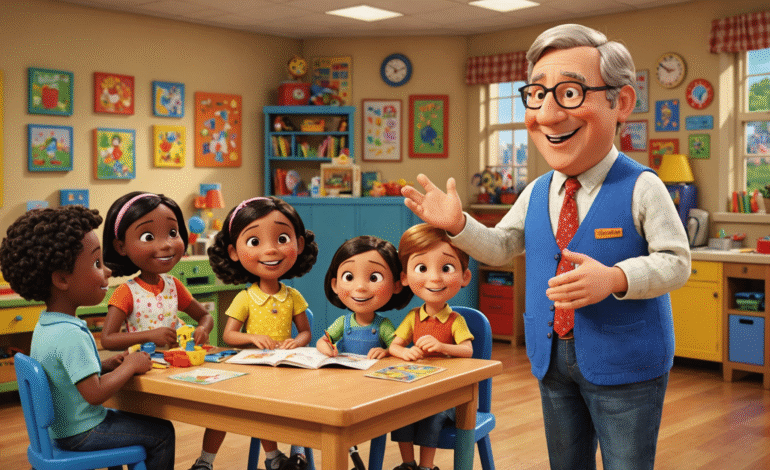Fred Rogers Net Worth: The Man Behind the Money


How much is kindness worth? That’s a question few people ever really try to answer—and when it comes to Fred Rogers net worth, it’s not just about dollar figures or salary stats. For decades, families across America tuned in to see Mister Rogers’ gentle voice teaching values that felt timeless and true. But let’s be honest—curiosity about Fred Rogers’ finances bubbles up for good reason.
Did television’s favorite neighbor live modestly because he had no other choice? Was there hidden wealth behind those signature sweaters? And why do so many sources settle on roughly $3 million as his estate’s value at the time of his passing?
Peeling back the layers here means more than scanning a celebrity spreadsheet or counting merchandise checks. Instead, let’s take a clear-eyed look at Fred Rogers’ journey from small-town kid to national icon—a path shaped by privilege but defined by purpose. If you’re searching for answers about “fred rogers net worth,” this breakdown doesn’t just chase numbers; it digs into origins, aspirations, and choices that set him apart.
Early Life And Education
Long before “Mister Rogers’ Neighborhood” was even an idea, Fred McFeely Rogers was learning lessons about generosity and hard work within the walls of his family home in Latrobe, Pennsylvania.
Born into a household where business acumen met community spirit—his grandfather having been a successful businessman—Rogers enjoyed certain advantages that shaped both character and opportunity. This wasn’t just any childhood; stability ran deep enough for him to inherit not only material comfort but also a sense of responsibility toward others.
School wasn’t simply about earning grades or moving up year after year. For young Fred:
- Music became an early companion (he later earned a music composition degree from Rollins College).
- The Presbyterian faith provided anchor points of empathy and humility.
- Battling health challenges as a child made him more attuned to feelings of loneliness—a theme echoing through every episode he’d one day film.
He didn’t always dream in technicolor sets or puppet scripts either.
In fact, initial ambitions leaned more toward ministry or music than mass media. To some extent, it looked like life’s roadmap would keep him out of any TV studio altogether—until broadcasting became less about glamour and more about service in his eyes.
Career Beginnings In Television And Beyond
When Fred took tentative steps onto Pittsburgh’s local airwaves during the 1950s at WQED (the country’s first community-supported station), there were few signposts pointing toward stardom—or riches.
A table below outlines key milestones that marked this formative stretch:
| Year/Period | Milestone/Event |
|---|---|
| 1951–53 | Began as assistant producer on NBC’s “The Voice of Firestone” |
| 1953–64 | Pioneered children’s programming at WQED Pittsburgh (“The Children’s Corner”) |
| 1966–67 | Developed pilot episodes for “Mister Rogers’ Neighborhood” |
| 1968 Launch Year | “Mister Rogers’ Neighborhood” debuts nationally via PBS syndication |
What did all this mean financially? Certainly not instant wealth—not even close compared to flashy TV deals elsewhere in pop culture at the time.
Early contracts reflected priorities that feel almost foreign now: production quality over personal gain; educational impact over brand building; community funding before commercial sponsorships.
At launch, “Neighborhood” saw steady—but not explosive—traction.
All of which is to say: If anyone expected quick payouts for kind storytelling and cardigan wardrobes… well, they probably missed what drove Fred entirely.
His own words—and later interviews with colleagues—underscore something often overlooked today: long hours spent writing scripts by hand; active fundraising efforts that prioritized crew salaries over pay bumps for himself; enduring belief that public television belonged first to its viewers.
And while “fred rogers net worth” may get tossed around online with estimates up to $10 million (see consistent figure breakdowns summarized on reputable sites), reality anchors closer to $3 million at death—a number reflecting steady royalties from books and licensing but never inflated by blockbuster Hollywood logic.
That gap between cultural impact and bank balance tells its own story:
- A man who could have cashed out sooner chose instead to reinvest earnings into better programming—for everyone.
To some extent, that’s where mystery turns into meaning.
Income Sources Driving Fred Rogers’ Net Worth
Why does a guy known for cardigans and gentle talk about feelings show up in conversations about wealth? The short answer: fred rogers net worth was quietly built through streams most folks miss, despite his modest lifestyle. If you ever wondered whether Mister Rogers became rich by being everyone’s TV neighbor, let’s unpack what really filled his bank account.
TV money sounds like a jackpot. But here’s the kicker—Fred Rogers never treated Mister Rogers’ Neighborhood like a cash grab. Reports and recollections from producers reveal he kept his salary on the low end so that more of PBS’s funding would go into puppets, music, and set design rather than personal profit.
Books were another lane where some might expect a windfall. He published several children’s books and parenting guides. These titles still pop up on shelves today, keeping royalties trickling into the estate long after reruns ended.
What about merchandise? While it’s true the show had toys and educational materials with Fred’s image or characters stamped on them, he insisted licensing deals only went forward if they matched the program’s values—meaning no cheap plastic spin-offs flooding big-box stores. Sure, these deals added to fred rogers net worth, but always with strict quality control.
- Speaking engagements: When he spoke at universities or conferences (and there were plenty), fees went straight back into children’s causes or production costs far more often than his wallet.
The Investment Strategy Behind Mister Rogers’ Financial Security
Not every celebrity investor is out flashing stock tips or luxury condos—but behind the scenes, even humble icons have to keep their finances healthy. So how did fred rogers net worth stay steady?
He grew up in a well-off family in Pennsylvania; sources suggest he inherited some real estate from relatives who owned large tracts near Pittsburgh. Owning property gave him stability and allowed for careful stewardship rather than high-risk flipping or flashy new builds.
Then there’s classic portfolio balancing: insiders say it’d be hard to imagine him not putting funds into blue-chip stocks over time—think broad-market mutual funds instead of wild bets on tech start-ups.
- A philosophy rooted in responsibility: Friends recall how Fred talked openly about living within your means—even as income rose—and making sure investments did good alongside earning returns.
- Charity as part of strategy: A portion of profits found its way to Pittsburgh-area nonprofits and public broadcasting foundations. For him, giving wasn’t an afterthought—it was baked right into how he handled wealth.
Lifestyle Choices That Defined Fred Rogers’ Relationship With Money
Let’s get honest: most people with a $3 million nest egg indulge at least a little bit. Here’s why fred rogers net worth never turned into tabloid headlines about mansions or sports cars.
Even neighbors noticed nothing extravagant about daily life at Casa Rogers—a simple brick house filled with keepsakes from fans and friends rather than rare art collections or gold-plated décor.
- Lifestyle choices: He bought used cars long before “eco-conscious” made it cool.
Mister Rogers famously wore those hand-knit sweaters from his mom—not designer gear—and rarely splurged beyond basic comforts for himself or family.
If there was any major purchase tied to fred rogers net worth, it came via donations to libraries or community theaters that needed help staying open when grants dried up.
The bottom line? His spending habits lined up perfectly with what viewers saw onscreen: warmth over flashiness, generosity over accumulation. All of which is to say—the funny thing about fred rogers net worth isn’t just its size; it’s how little it changed him along the way.
Fred Rogers Net Worth: The Truth About His Legacy and Estate
Let’s be real—most people never wonder what Mister Rogers’ bank balance looked like. They care about how he changed lives. But every so often, the question pops up: Did Fred Rogers get rich off that cardigan? Or did he quietly amass a fortune nobody talks about?
Here’s the deal. At his death in 2003, multiple respected sources converge around one figure: $3 million net worth. No wild swings, no hidden Hollywood mansions, just the steady accumulation of someone who put purpose above profit.
- Main asset pools: Royalties from “Mister Rogers’ Neighborhood,” book publishing deals, licensing for toys and merch.
- No evidence of excessive salary grabs or big investments.
- Family money played a minor role; he came from privilege but didn’t flaunt it or multiply it through high-risk ventures.
The upshot? Unlike most celebrity stories where estates splinter into lawsuits, Fred’s assets flowed with almost as much intentionality as his words on TV. Reports indicate estate planning steered royalties and residuals toward family (his wife Joanne and children), plus charity efforts tied to children’s education and public broadcasting support.
Fred Rogers Net Worth Influence: Impact on Public Television’s Survival
All of which is to say—he wasn’t just earning; he was giving back, strategically and relentlessly.
If you’re looking for proof that money can fuel mission without getting in its way, look at how Fred used his resources:
1. Funding Contributions: In those dark stretches when PBS funding dried up (think government cuts threatening local stations), Rogers actively lobbied Congress, sometimes appearing in person to defend kids’ programming budgets.
2. Advocacy for Public Broadcasting: He became more than a TV host; he was an economic firewall against political whims—his testimony famously unlocked $20 million for public television during Nixon-era belt-tightening.
3. Long-term Financial Influence: Thanks to ongoing syndication rights and smart estate management, “Mister Rogers’ Neighborhood” continues feeding revenue into both his foundation work and the PBS ecosystem.
So if you’re worried whether caring can outlast commerce—the lesson here is yes, but only if someone sweats every detail behind the scenes like Fred did.
The Modern Value of Fred Rogers’ Legacy: Properties, Merch Sales & Foundation Muscle
Fast-forward to today: what would all this translate into? How does “fred rogers net worth” stack up after inflation—and has nostalgia created a new kind of cash flow?
Turns out current property values attached to Rogers aren’t headline-making compared to other pop culture giants—but they carry symbolic weight far beyond their price tags. The real modern gold mine sits elsewhere:
– Merchandise sales haven’t vanished; vintage sweater replicas still move online (and not ironically).
– Books authored by Rogers are perennial sellers in parenting sections across North America.
– Digital licensing keeps his name alive with streaming rights feeding fresh income channels annually.
– The nonprofit arms he inspired continue managing millions—in fact, The Fred Rogers Company (now Fred Rogers Productions), spun out from these initial assets, owns creative IP rights that fund new shows built on his principles.
The funny thing about legacy wealth—it rarely looks glamorous upfront but builds power over time through audience trust rather than hype cycles or speculation bubbles.
In sum? If you came searching for the shock stat or some scandalous secret hiding under that zip-up cardigan—you won’t find it here. Instead, think measured influence over outright riches—a financial engine fine-tuned not just to endure but expand kindness at scale decades after Mister Rogers first walked through that iconic door.
And that’s why the phrase “fred rogers net worth” isn’t really about dollars—but about compounding impact long after the cameras stopped rolling.






